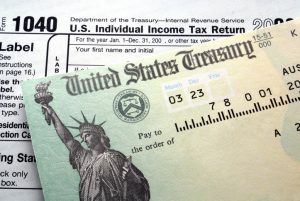
It’s that time of year again and millions of Americans are anxiously awaiting their reward for being responsible, IRS-abiding citizens: their tax refunds. And while many are finding their refunds are lower this year or that they actually owe the IRS, read on for some ways the rest of us can invest ours.
It goes without saying that any type of investment requires financial discipline and that’s especially true when it comes to tax refunds. When the big, fat check seemingly falls in your lap, it can almost feel like free money. Resist the urge to splurge on the latest tech or a romantic getaway; remember, you worked for this money and now it’s time to put it to work for you.
Increase your workplace retirement plan contributions
Any lump sum of cash we receive gives us an opportunity to increase our investment in a workplace retirement plan over a period of time. For example, you can increase your 401(k) contribution and use your refund to cover the difference in your take-home pay. How much you raise your contribution and for what length of time is up to you.
This is a great way to invest in your retirement while lowering your taxable income.
Pay off high-interest debt
While your tax refund certainly isn’t free money, it can be a small financial windfall to put toward your debt, especially high-interest credit card debt. Many people don’t consider their tax refunds when planning their finances, so investing a tax refund in paying off your debt can do a lot to reduce your repayment time frame.
However, when you have lower-interest rate debt, you may want to consider the benefit of investing your tax return in something that will give you a greater return.
Contribute to your emergency fund
In a way, tax refunds are a result of forced savings. When we are already responsibly saving and investing our take-home pay, the lump sum of our refunds may seem superfluous. However, it represents a great opportunity to add to your emergency fund.
An emergency fund can provide financial assistance when we need it most; that is, when we have an unexpected medical expense, car maintenance, job loss, home repairs, or anything else that springs up without warning. According to most financial experts, an emergency fund should be able to cover at least three months of expenses.
You may find it difficult to hide your tax refund cash for a rainy day, but when it pours, you’ll be glad you did.
Prepare for education costs
If you’re a new parent or have young children, it’s never too early to start saving for their college expenses. If you’re already confident in your retirement and long-term financial security, putting your extra money toward a 529 college savings plan can go a long way toward making your child’s life easier in the not-too-distant future.
Give to others
If you have absolutely no other financial priorities, or if there’s a cause you would like to support, you can use your tax refund as a gift or as a donation to a charity. For 2019, the IRS set the annual limit on tax-free gifts at $15,000. Also, for donations to qualified charitable organizations, you may be entitled to a charitable contribution deduction against your income tax if you itemize deductions.
For more financial information, follow NEXT Financial Group, Inc. (NEXT) on Facebook and LinkedIn and subscribe to this blog at the right-hand side of the page.
https://turbotax.intuit.com/tax-tips/tax-refund/7-smart-ways-to-invest-your-tax-refund/L32cGdWtg
https://www.thebalance.com/smart-tax-refund-investments-4134434
Neither NEXT Financial Group, Inc. nor its Representatives give tax or legal advice.






